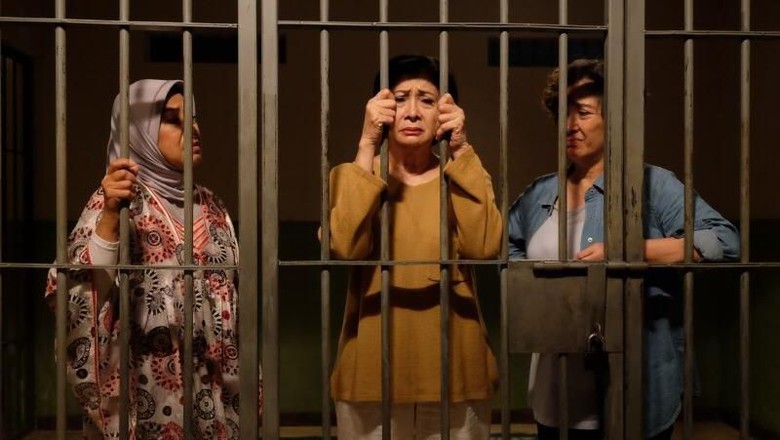Singapore’s Foreign Language Film Oscar entry is an action-adventure that reinvents colonial Indonesia as the equivalent of a lawless Western frontier region.
Indonesian expats of noble lineage learn the cowboy ropes in California before returning to their homeland on a mission seeking revenge against the island nation’s colonial rulers in period actioner Buffalo Boys. As Singapore’s official Oscar submission, Mike Wiluan’s distinctly Asian riff on the classic Western should grab attention for its inventive interpretation of familiar genre themes, even if it doesn’t pose much of a threat to the acknowledged frontrunners in the Best Foreign Language Film category.
After serving as a producer on a variety of regional and international titles (including Crazy Rich Asians), Singapore-based Wiluan has crafted a debut feature that’s well attuned to international genre preferences, but seems tonally less assured. As a result, Buffalo Boys ends up somewhat awkwardly caught between mainstream glorifications of violence and more restrained cultural norms emphasizing respect and harmony.
This inherent creative conflict however remains mostly obscured by the action-oriented plot, which gets off to a rousing start after colonial officer Van Trach (Reinout Bussemaker) murders Hamza (Mike Lucock), the hereditary ruler of an Indonesian sultanate, and places his territory under brutal Dutch control. On the run, his brother Arana (Tio Pakusadewo) flees with the sultan’s two infant sons, raising them as his own children in distant California.
By 1860, easygoing Suwo (Yoshi Sudarso) and his rather taciturn older brother Jamar (Ario Bayu), have achieved recognition as formidable brawlers and gunfighters while working on the Pacific railroad. Now that they’ve come of age however, Uncle Arana decides that they should all return to Java so that the brothers might reclaim their rightful heritage from Van Trach.
Wiluan perhaps shortchanges audiences with these brief English-language opening scenes, where the Indonesians demonstrate their affinity for six-shooters, cowboy hats and Western drawls, as well as their familiarity with a certain universal type of frontier justice. A bare-knuckle boxing match followed by a shootout aboard a speeding train don’t do much to establish the trio’s expertise as would-be revolutionaries, but the setting conveys sufficient context to set them on their mission, however far-fetched it may be.
Arriving in Java, they travel overland incognito hoping to avoid detection by Dutch soldiers and soon encounter some ruffians attempting to rob a merchant and ravage his pretty young granddaughter Sri (Mikha Tambayong). The three quickly intervene, dispatching the attackers and in the process blinding hired thug Fakar (Alex Abbad), who just happens to be one of Van Trach’s henchmen. The travelers continue on to the locals’ village, which lies within the boundaries of their ancestral domain, where headman Sakar’s (Donny Damara) daughter Kiona (Pevita Pearce) treats them to a remarkable display of skill with bow and arrow as she rides aback a galloping water buffalo.
Soon enough though, Fakar catches up with them, accompanied by Van Trach’s lieutenant Drost (Daniel Adnan), who summons the villagers to a meeting with his boss. When the rendezvous turns out to be a trap and Van Trach executes the clan’s leaders, Arana, Jamar and Suwo have no choice but to side with the locals, thrusting themselves into direct confrontation with their Dutch oppressors.
Leveraging highly polished production values evoking the Old West with detailed sets, authentic weapons and period costumes, Wiluan gets enough of the details right so that the genre’s typical characteristics blend fairly seamlessly with the Indonesian adventure yarn. So when events inevitably lead to a final shootout on a nearly deserted frontier town Main Street, Buffalo Boys offers up all of the action beats expected from any decent Western.
While these stylistic accomplishments are impressive, the fairly basic plot doesn’t demonstrate a similar level of sophistication. Rooted in a simplistic revenge narrative, developments progress with familiar predictability, embellished by a couple of romantic subplots, as Suwo and Kiona develop a mutual attraction and Arana unearths a surprising discovery from his past.
Similarly, performances across the sprawling cast remain fairly one-dimensional, with the exception of Bussemaker, standing out as the nefarious colonialist, and Indonesian veteran Pakusadewo, who dominates his scenes as iron-willed, warm-hearted Uncle Arana.
Distributor: Samuel Goldwyn Films
Production companies: Infinite Studios, Bert Pictures, Zhao Wei Films
Cast: Yoshi Sudarso, Ario Bayu, Pevita Pearce, Tio Pakusadewo, Reinout Bussemaker, Daniel Adnan, Mikha Tambayong, El Manik, Alex Abbad, Mike Lucock, Daniel Adnan, Donny Damara
Director: Mike Wiluan
Screenwriters: Mike Wiluan, Raymond Lee
Producers: Mike Wiluan, Huang Junxiang, Tan Fong Cheng, Rayya Makarim, Kimberly James
Executive producers: Eric Khoo, Natalya Pavchinskaya, Freddie Yeo, Kris Wiluan, Huang Junxiang, Christopher Smith, Michy Gustavia, Mo Shuyi, Sukdev Singh, Wicky Olindo, Bert Tan
Director of photography: John Radel
Production designer: Pawas Sawatchaiyamet
Costume designer: Preeyanan Suwannathda
Editor: Natalie Soh
Music: Yudhi Arfani, Zeke Khaseli
Venue: Palm Springs International Film Festival
103 minutes








